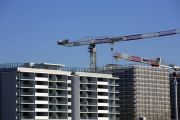
Qld won't release modelling on land tax increase
The Palaszczuk government will not release modelling to justify its controversial multi-jurisdictional land tax changes that will slug investors when the start next year.
As investors scramble to work out how many thousands of dollars more they will pay in land tax, Treasurer Cameron Dick is standing firm on the new tax that will hit landholders from 2023-24.
Investors and the Real Estate Institute of Queensland have called on the treasurer to scrap the changes, which introduce land tax based on property people own in other states.
A spokesman for Mr Dick said the law changes were announced in December last year and would not come into effect until July 1 next year, giving landholders 561 days to make adjustments to their investment portfolios.
“All material relevant to the revenue forecasts for the land tax changes has been outlined in the 2021-22 budget update, the explanatory notes to the relevant legislation or the 2022-23 budget estimates hearing,” the spokesman said.
“The land tax changes were first announced in the 2021-22 budget update on 16 December 2021.”
Queensland Treasury has previously said the tax change will raise only $20 million a year from 2023-24 and impact about 10,000 landholders, most of whom who live interstate.
During recent budget estimate hearings, Under-Treasurer Leon Allen would not confirm there was full economic modelling done on the tax change, which investors claim will hit them with extra tax of up to $25,000.
He told the hearings a “range of information was put into that whole decision-making process”.
Opposition treasury spokesman David Janetzki said it was clear there had not been thorough analysis of the land tax changes before they were announced.
“It’s becoming typical of the Palaszczuk government that it seeks to implement this tax without modelling, proper consultation or detailed analysis,” he said.
“Economists, property industry experts, lawyers and academics are raising new concerns every day. It’s difficult to recall a more poorly prepared or considered tax policy. It will drive out investment and drive up rents.”
In December last year, Mr Dick announced the changes to land tax to include interstate land holdings, claiming some interstate investors “exploited tax-free thresholds in different jurisdictions to minimise their tax obligations”.
In an Australian-first, landholders will have to voluntarily disclose their interstate holdings in other states before being taxed for their Queensland holdings.
A Sydney-based investor told The Australian Financial Review on Monday that his land tax bill would jump by about $27,000 next financial year as a consequence of the state’s new tax rule.
Another said his land tax would rise by $15,000 to $20,000 a year.
Other investors are irate with the changes, saying they will drive investors out of Queensland as well as push up rents and that they felt like they were being taxed twice in two different states.
“The new rules are a disgrace. They impact Queenslanders, non-Queenslanders and tenants,” another investor said.
Another investor, who did not want to be named, said they would have no choice but to pass the increases onto their tenants.
NSW Finance Minister Damien Tudehope is seeking advice on whether the Queensland scheme, which relies on the goodwill of revenue offices in other states to pass on information to be effective, is constitutional.
Property Council of Australia’s Queensland executive director, Jen Williams, said it had repeatedly raised concerns about the unorthodox method of calculating land tax that required landholders to self-report and cross-checking with land tax systems in other states.
“At a time where the state is in the midst of a housing supply and affordability crisis, it appears counterintuitive to introduce any adjustment, or for that matter any new tax, upon the industry,” Ms Williams said.
“This is not just closing a tax ‘loophole’, it is the most significant reform to a land tax system that has operated effectively for decades, and it should have been consulted upon to the same extent that a reform of its magnitude would normally entail.”











